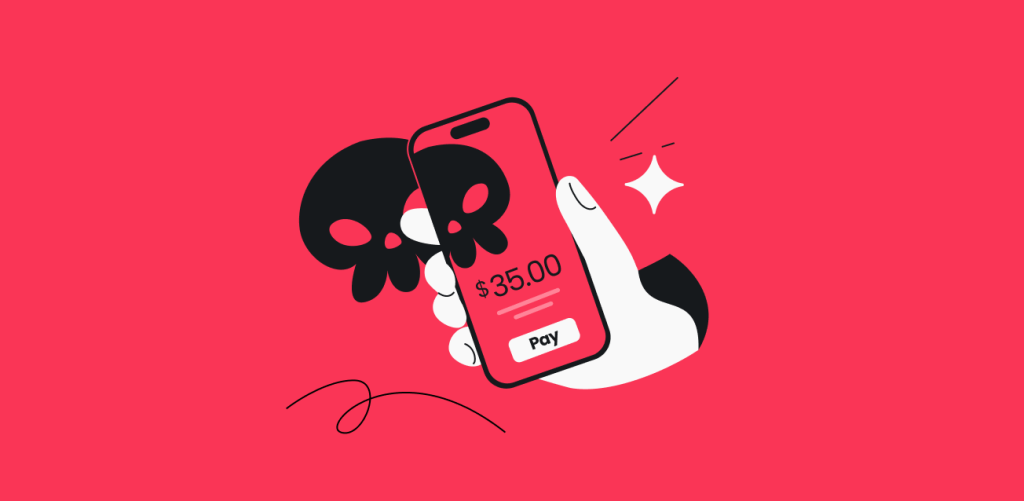If you’re not using services like Cash App to send and receive money, you might as well be living in the Stone Age.
And while digital wallets unlock simple and speedy payments, they’re not 100% safe. Cash App scams are on the rise, so there’s never been a better time to learn how to stay safe on the app.
What are the biggest Cash App scams, and how can you protect yourself against them? Continue reading to be well-equipped if you ever find yourself in a bind.
How does Cash App work?
Cash App (formerly known as Square Cash) is a mobile payment service that lets users send and receive money with just a few taps on their smartphones. Boasting 57 million monthly users, Cash App is popular for its simplicity.
To get started, users download the app, create an account, and link their bank account or debit card. Once set up, you can request payments, send funds, and pay for various goods and services. It’s also a convenient choice for splitting bills among friends or sending money to family.
Beyond completing peer-to-peer payments, Cash App users can also:
- Link the app to their bank account or credit card;
- Buy and sell cryptocurrency;
- Take out personal loans;
- Trade stocks;
- File taxes.
However, this ease of use and flexibility makes Cash App a prime target for scammers. The speed and anonymity of online payments can lead to fraudulent transactions, the exposure of sensitive data, and downright financial loss. Americans lost a record $12.5B to cybercrime in 2023, so online fraud is no joke.
The good news? Awareness is your best defense against these Cash App scams.
What are the most common Cash App scams?
Cash App scammers are sneaky and can employ various techniques to trick unsuspecting users. Here are the most common scams to watch out for on Cash App.
1. Phishing scams
Phishing scams involve criminals presenting themselves as legitimate sources — think Cash App customer support — to deceive you into sharing personal information, like your login credentials or bank details.
Phishing scams often take the form of fraudulent emails or text messages that appear to come from trusted entities. These messages frequently copy Cash App’s branding and link to fake websites that steal your data. With just your Cash App username and password, scammers can easily withdraw any funds stored in your account.
2. Fake payment scams
In a fake payment scam, a fraudster sends you a notification claiming they’ve mistakenly sent you a payment and asking you to return the money. The thing is, the payment never actually happened. The notification may look real, but it’s completely fabricated.
These scams play on confusion and urgency, hoping to catch you off-guard. Once you send the funds — and eventually realize something’s not adding up — the scammer is long gone.
3. Impersonation scams
Impersonation scams involve criminals pretending to be people you know, like friends or relatives, and sending panicked messages asking for money. These messages typically describe an emergency that requires immediate assistance.
Such scams can be tough to recognize because they use your relationships and trust against you. Hackers can even use stolen profiles or make fake accounts — complete with a forged profile icon — to craft a more convincing deception.
4. Loan scams
Loan scams promise fast loans or financial help, often targeting people in need of quick cash. Fraudsters offer seemingly favorable terms but ask for some upfront payment or sensitive information before providing the loan.
Victims who comply are left high and dry. They don’t get the promised loan and might experience identity theft if they give up the wrong data. Cash App users in dire financial straits are especially vulnerable to these scams.
5. Accidental payment scam
Mistaken or accidental payment scams involve criminals moving funds into your Cash App account. They’ll contact you saying it was an accident and ask for the money back. Naturally, most victims send the money back right away.
The problem? The original funds are usually stolen from some other account. Cash App will likely discover the initial fraudulent transaction and cancel the deposit into your account. However, your transfer will stand as it looks like pure goodwill, leaving you with nothing but lost funds.
6. Rental deposit scams
Rental deposit scams occur when Cash App scammers pose as landlords and offer properties for rent that either don’t exist or aren’t available. They’ll ask for a deposit before letting the victim view the property, promising to secure the rental.
Once the deposit is sent, the scammer disappears in a puff of smoke. Victims are left out of luck, out of home, and out of pocket.
7. Investment scams
In investment scams, fraudsters promise huge returns on investments made through Cash App. Also known as cash flipping scams, these involve victims getting elaborate stories about can’t-miss financial opportunities or some kind of insider knowledge they can exploit.
Lured by the promise of easy wealth, the victim impulsively transfers their funds. The scammer promptly vanishes without a trace, leaving you with no returns and no way of recovering your money.
8. Cash Card scams
Scammers can target a Cash App user’s Cash Card, a prepaid debit card linked to your Cash App account. They may pose as a trusted contact or someone from Cash App’s support team to get you to reveal your card details or grant them access to your account.
Once they have your info, the scammer can make whatever purchases or withdrawals they please on your Cash App card — without your authorization or knowledge.
9. Data breach scams
In data breach scams, criminals use information stolen from data breaches, like your email address or bank account details, to access your Cash App account and make unauthorized transactions.
Data breach scams are hard to detect because the victim’s data is often compromised long before the fraud is committed. Victims may be unaware of the breach until they spot suspicious activity on their accounts. By then, it’s usually too late to take any corrective action.
10. Job offer scams
In job offer scams, fraudsters offer fake job opportunities that require upfront payment via Cash App for “training” or “materials.” People actively looking for work are commonly targeted, so the job offer usually comes across as urgent or too good to pass up.
Victims who send money to secure the job eventually learn that the offer was fake from the start. The job offer was never genuine, and the scammer disappears as soon as they receive the funds.
11. Charity scams
Charity scammers take advantage of your generosity by pretending to represent a legitimate cause. They typically reach out over social media, text messages, or emails, claiming to be raising money for a charitable cause like disaster relief, poverty alleviation, or food security.
Charity scams routinely use emotional stories or fabricated events to convince people to donate quickly via Cash App. Victims can lose money and give away sensitive data like credit card numbers. Since these scammers prey on your emotions, their deception can be difficult to detect.
12. QR code scams
In a QR code scam, fraudsters create fake codes that, when scanned, direct users to phishing sites designed to steal their personal data or Cash App login credentials. These knock-off codes can be displayed anywhere — emails, posters, public spaces, you name it.
The danger in these scams lies in the fact that QR codes hide their destination until they’re scanned. You typically can’t tell if you’re visiting a bona fide site or a scam page until the damage is done.
13. Social Security scams
Social Security scams involve criminals pretending to work for a government agency and asking for your SSN (Social Security number) or other details under false pretenses. These scammers might claim your SSN has been compromised or (disingenuously) offer to fix issues related to your account.
With your SSN and info as innocent as your phone number, scammers can create fake Cash App accounts in your name, steal funds from your existing account, and even commit tax fraud thanks to Cash App’s tax filing services.
14. Prize and lottery scams
Another way to get scammed on Cash App is with prize scams. These involve receiving a message claiming you’ve won cash, a gift card, or even a plane ticket. To claim the prize, victims are prompted to share Cash App account details or complete a test transaction to unlock their winnings.
The catch? There’s no prize. Once your money winds up in the scammer’s account, the fraudster drops off the radar and leaves you empty-handed.
15. Government relief payment scams
Government relief scams tend to pop up during and after times of crisis. These online scams have criminals posing as government officials offering aid, relief funds, or stimulus payments. They request data like your Cash App credentials to supposedly process your payments.
This form of Cash App fraud may use official-sounding language or genuine-looking phishing emails, so it’s easy to neglect common-sense safety measures before sharing your login details.
16. Fake security alerts
In this scam, criminals pose as the Cash App team and send fake security alerts, falsely warning you that your account is at risk. The alerts urging you to share your account details or bank account information may come via email, text, or phone.
Once you hand over your login credentials, scammers can hijack your account and have full control over your Cash App payments. By mimicking a trusted source, hackers can convince users to share their personal data on unsecured communication channels.
What to do if you get scammed on Cash App
If you fall victim to a scam on Cash App, take these steps to maximize your chances of protecting your account — and your money.
- Report the scam: the first thing to do is contact Cash App support. They have a dedicated team to assist you in recovering lost funds;
- Contact your bank: if your Cash App account has a linked bank account, inform your financial institution about the suspected fraud. Your bank may be able to reverse the transaction or take additional steps to safeguard your account;
- Secure your account: change your Cash App password immediately. Activate touch ID, use a sign-in code, or enable 2FA (Two-factor Authentication) for that added layer of protection;
- Document everything: keep records of all communications with the scammer and share them with Cash App’s customer support. Any documents can strengthen your case if you need to escalate the issue further;
- Educate yourself: read up on phishing attacks and customer support scams to be better prepared to handle them — and avoid them — in the future;
- Leverage Cash App: don’t forget about Cash App fraud protection. The app has features like scam detection, a refund policy, and a payment dispute process to help keep your Cash App balance intact.
How to protect yourself from Cash App scams
Preventing scam payments is always better than dealing with the consequences of an attack. Here are some proactive measures to boost your safety while using Cash App.
- Use a VPN (Virtual Private Network): launching a VPN like Surfshark encrypts your internet connection and masks your IP (Internet Protocol) address. This makes it harder for scammers to intercept your sensitive information, especially when using public Wi-Fi;
- Verify your contacts: double-check the identity of anyone you send payments to, and only transfer funds to verified Cash App accounts. If possible, reach out to others through a separate channel to confirm they are who they say they are;
- Avoid suspicious links: if you receive unknown links via email or text, be wary. These are usually how scammers get their foot in the door, so steering clear of them altogether is an excellent way to prevent falling for a scam payment in the first place;
- Know the warning signs: offers that seem too good to be true often are. Trust your instincts, and don’t fall for promises of quick money or other kinds of emotional manipulation.
Make Cash App payments with confidence
Cash App offers a convenient way to send and receive money, but you have to stay vigilant whenever you’re online. However, knowing the most common Cash App scams and taking preventative measures can significantly reduce your risk — measures like getting a VPN.
A VPN makes it difficult for hackers to steal your data or track your online activities, protecting you from fraudulent payment requests and other online threats.
FAQ
What happens if a random person sends you money on Cash App?
If a random person sends you money, there’s a good chance it’s part of a scam where they ask you to return the money. Instead of sending it back, contact Cash App support to report the incident and avoid interacting with the sender.
Will Cash App refund money if scammed?
You may receive payment from Cash App after getting scammed, but it’s not guaranteed. Cash App has a limited refund policy, so immediately report any scam to Cash App support.
Are there Cash App scams on Facebook?
Yes, scams involving Cash App are common on social media, and Facebook is no exception. Always confirm the identity of anyone you interact with on your social media accounts, and make sure you’re sending money to a verified Cash App account.
Why would a scammer want to send me money?
A scammer might send you money using Cash App or another mobile payment service to trick you into sending the money back. This is frequently done with a stolen credit card, and once the fraud is flagged, Cash App will reverse the original payment. Always contact Cash App support if you receive funds from an unknown person.
I got scammed on Cash App. What do I do?
If you got scammed on Cash App, follow these steps to minimize your chances of facing financial harm:
• Report the scam to Cash App;
• Contact your bank;
• Secure your account with 2FA;
• Document all communication with the scammer;
• Educate yourself on common scams;
• Take advantage of Cash App’s payment dispute policy and other protective features.





